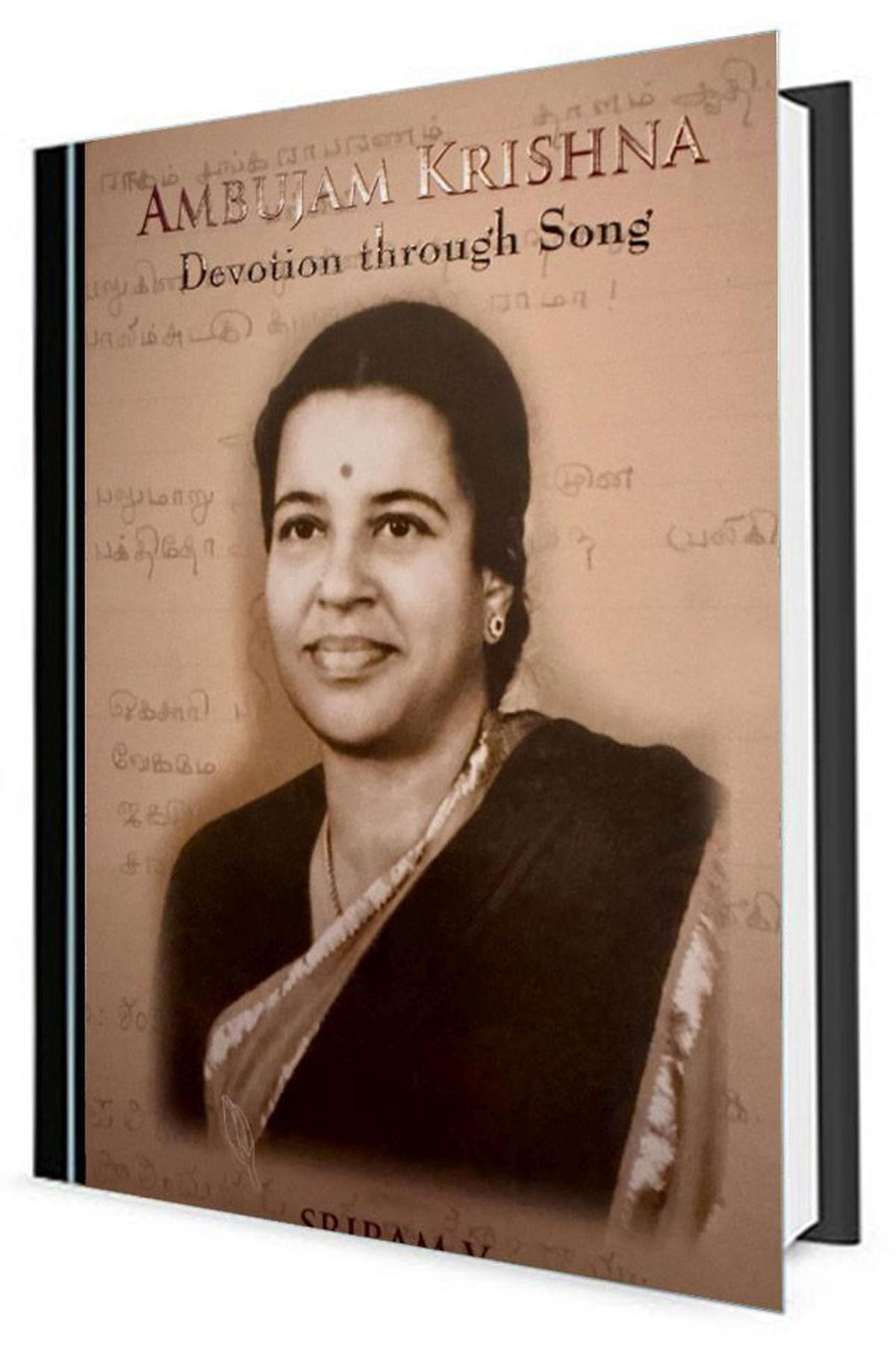- November 19, 2025
Into the world of Ambujam Krishna’s poetry
The compositions of Ambujam Krishna (1917-1989) are outpourings of profound devotion and evocative poetry. With an estimated oeuvre of over 600 songs, primarily in Tamil, and also in Telugu, Kannada, Malayalam, Hindi and Sanskrit, she has, to her credit, songs in Manipravalam too, a literary genre characterised by a medley of languages within a single composition.
Marked by simplicity, her songs are typically heartfelt pleadings to the Almighty for succour, drawn appropriately from the epics and puranas. This foundation, combined with her nuanced understanding of multiple cultures and idioms, gave her an exemplary composing acumen. Her innate sense for how lyrics would blend with melody ensured they were perfectly suited for setting to music as kritis.
Ambujam Krishna.
| Photo Credit:
The HIndu Archives
Over decades, Ambujam Krishna’s lyrics have attracted renowned musicians and scholars such as V.V. Sadagopan, Musiri Subramania Iyer, Semmangudi Srinivasa Iyer, Dr. S. Ramanthan, T.N. Seshagopalan, K.C. Thyagarajan, K.R. Kedaranathan, Madurai N. Krishnan, Ananthalakshmi Sadagopan, R. Vedavalli, Charumathi Ramachandran and R.K. Shriramkumar, who have set her words to music. And this process of musical interpretation continues even today, 36 years after her passing, serving as a testament to the enduring appeal of her lyrics.
Highlighting the lyrical beauty

Devotional Through Song, a biography of Ambujam Krishna, authored by historian V. Sriram.
| Photo Credit:
Special Arrangement
The family of Ambujam Krishna organised an exclusive vocal recital of her compositions by Sikkil Gurucharan at the Music Academy on the occasion of the release of her biography Devotion Through Song, authored by well-known historian V. Sriram. The concert proved to be a memorable journey through the distinguished composer’s works, with Gurucharan’s rendition illuminating the many facets of her kritis. His clear enunciation of the songs brought out their lyrical excellence, and his judicious approach — limiting the manodharma aspect to the bare essentials — enabled him to present as many as 10 songs. The repertoire featured six kritis in Tamil, one each in Telugu, Malayalam, Hindi and Manipravalam. The accompaniment of V. Sanjeev (violin), N.C. Bharadwaj (mridangam) and S. Krishna (ghatam) provided perfect synergy.
Sikkil Gurucharanwith V. Sanjeev (violin), N.C. Bharadwaj (mridangam) and S. Krishna (ghatam).
| Photo Credit:
VELANKANNI RAJ B
That Gurucharan showcased Ambujam Krishna’s lesser-known compositions even in ragas such as Karnaranjani and Bilahari, in which ‘Om namo narayana’ and ‘Kaanbadheppodhu’ are popular, was a pointer to his diligence and sense of occasion.
An evocative Karnaranjani
Gurucharan commenced the recital with the famous shloka ‘Yaakundendu tusharahara dhavala’ in Mayamalavagowla serving as a prelude to ‘Sangeeta devate saraswathi’, a salutation to the ‘Goddess of Music’ in the same raga. The charanam portrays the deity’s form and attributes, extolling her as the bestower of the 64 kalas. The short, nuanced swarakaplana at the pallavi line further enhanced this invocation. After outlining the raga Karnaranjani, Gurucharan rendered ‘Vandhadaindhen sri rama ramayya’, fully revealing its emotive core. — a soulful plea for refuge at Rama’s feet.
Following a succinct Devagandhari alapana, the recital’s standout feature unfolded — ‘Maathaada bekayya’, a Manipravalam composition on Rama set to Misra Chapu. The lyrics featured Kannada, Tamil, Telugu and Sanskrit — the subtle shifts in language and the alliterations made it a linguistic delight. Gurucharan navigated this complex tapestry with aplomb.
The concluding line of the charanam, comprising all the four languages, delivered the thematic crux of the composition. The author here serves a potent reminder to the Lord: ‘Adutha arakkanukku abhayamichina neevu ahamasmi ini anjabedaa’ (You gave refuge to the demon (Vibhishana) who surrendered unto You, saying ‘I’m here, fear not henceforth’). With this, she implicitly slips in her own claim for divine protection.
This was followed by the reflective ‘Eppadi bhavakkarai serndhiduvaay, maname?’ in Bhavapriya, posing a poignant inquiry (How will you cross the ocean of worldly existence, O mind?). Gurucharan’s raga essay and the song rendition were perfectly in tune with the mood. He then presented ‘Sadguru neeve’, a Telugu composition in Amrutavahini set to Desadi tala, penned as a homage to Tyagaraja.
Bilahari, the main raga of the evening, was rendered in all its splendour by Gurucharan, and was well complemented by violinist Sanjeev. The song ‘Inru pol irundhida’ is a profound statement of contentment — a prayer to Rama for eternal status quo. A flowing niraval and sparkling swara passages at the pallavi ensued. The percussion duo of Bharadwaj and Krishna excelled in the two-kalai Adi tala tani avartanam, weaving energetic rhythmic patterns.
Bhava-rich rendition
Gurucharan then offered a bhava-laden rendition of the Malayalam piece ‘Innu kandu unnikrishnanai’ in Valaji. The next song was ‘Piravi-payan peralaam’, an internal monologue, set in a lilting Khamas. A bhajan in raga Gaavati ‘Maiyaa mori’ and the mangalam ‘Karumugil vannanukku’ in Madhyamavati drew the concert to a close.
It was a top-drawer performance by Gurucharan, who placed the composer before self. Yet, one cannot help but feel that, considering the significant contribution Ambujam Krishna has made to Carnatic music, her creations remain vastly under-represented in mainstream concerts even in Tamil Nadu.
Published – November 19, 2025 02:31 pm IST




